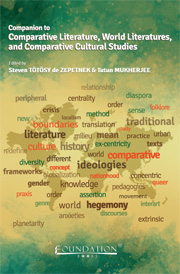Book contents
- Frontmatter
- Contents
- Introduction to the Companion to Comparative Literature, World Literatures, and Comparative Cultural Studies
- PART 1 Theories of Comparative Literature, World Literatures, and Comparative Cultural Studies
- The Contextual Study of Literature and Culture, Globalization, and Digital Humanities
- Comparative Literature and Ex-centricity
- Possibilities and Limits of Comparative Literature Today
- Comparative Cultural Studies and Pedagogy
- Teaching World Literatures
- Comparative Literature and the History of Literature
- Meltzl de Lomnitz, Comparative Literature, and Philosophy
- Comparative Cultural Studies and Cultural Anthropology
- Comparative Literature and Interart Studies
- Gender and Genre in Comparative Literature and (Comparative) Cultural Studies
- Comparative Cultural Studies and Translation Studies
- Comparative Cultural Studies and the Study of Medieval Literature
- Comparative Cultural Studies and Linguistic Hybridities in Literature
- Comparison and Postcoloniality
- (Inter)mediality and the Study of Literature
- PART 2 Comparative Literature in World Languages
- PART 3 Examples of New Work in Comparative Literature, World Literatures, and Comparative Cultural Studies
- PART 4 Multilingual Bibliography of Books in Comparative Literature, World Literatures, and Comparative Cultural Studies
- Index
Comparative Literature and Ex-centricity
from PART 1 - Theories of Comparative Literature, World Literatures, and Comparative Cultural Studies
Published online by Cambridge University Press: 05 April 2014
- Frontmatter
- Contents
- Introduction to the Companion to Comparative Literature, World Literatures, and Comparative Cultural Studies
- PART 1 Theories of Comparative Literature, World Literatures, and Comparative Cultural Studies
- The Contextual Study of Literature and Culture, Globalization, and Digital Humanities
- Comparative Literature and Ex-centricity
- Possibilities and Limits of Comparative Literature Today
- Comparative Cultural Studies and Pedagogy
- Teaching World Literatures
- Comparative Literature and the History of Literature
- Meltzl de Lomnitz, Comparative Literature, and Philosophy
- Comparative Cultural Studies and Cultural Anthropology
- Comparative Literature and Interart Studies
- Gender and Genre in Comparative Literature and (Comparative) Cultural Studies
- Comparative Cultural Studies and Translation Studies
- Comparative Cultural Studies and the Study of Medieval Literature
- Comparative Cultural Studies and Linguistic Hybridities in Literature
- Comparison and Postcoloniality
- (Inter)mediality and the Study of Literature
- PART 2 Comparative Literature in World Languages
- PART 3 Examples of New Work in Comparative Literature, World Literatures, and Comparative Cultural Studies
- PART 4 Multilingual Bibliography of Books in Comparative Literature, World Literatures, and Comparative Cultural Studies
- Index
Summary
Abstract: In her article “Comparative Literature and Ex-centricity” Tutun Mukherjee argues for the discipline of comparative literature to locate itself globally. The journey of comparative literature from an idea to a discipline has been a long and arduous one from its inception in the nineteenth century. The hallmark of this journey—fraught with crisis and anxiety—is its bi-directionality. While on the one hand there has been a continuous churning within the discipline, on the other hand, there has been a travel outwards into time and space which meant grappling with and addressing new issues and realities in an attempt to re-invent itself. Mukherjee discusses aspects of the discipline's self-examination that is marked by rumination and reflexivity, leading towards its resurgence. It also discusses the possible role comparative literature can play in new contexts and locations.
Introduction
Time and space—or history and geography—inform our literary imagination: they shape our thoughts and direct our perception of the world around us. Over a decade into the new millennium, drastic temporal and spatial changes have so re-mapped the human social, geo-political and ecological habitat that questions regarding the nature and function of literature—what it is and/or what it should be—demand to be re-visited. Such re-assessment would also make evident the successive changes that have become manifest in the sphere of its production, consumption, and reception.
- Type
- Chapter
- Information
- Companion to Comparative Literature, World Literatures, and Comparative Cultural Studies , pp. 36 - 48Publisher: Foundation BooksPrint publication year: 2014
- 1
- Cited by



